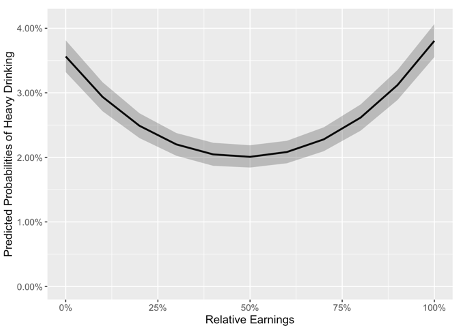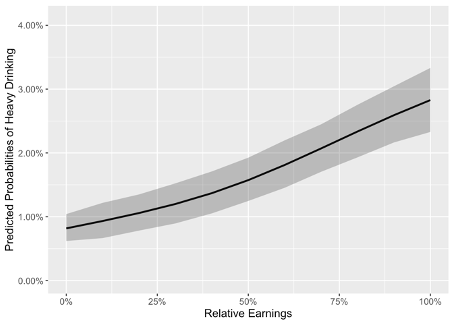
Heterosexual marriages where the wife earns more than her husband are increasingly prevalent in the United States. According to the Bureau of Labor Statistics, women out-earn their husbands in almost 30% of dual-earner couples in 2020, up from just 18% in the 1980s. This is despite the fact that traditional ideas endure and many men still feel strong pressure to be the family breadwinner.
Clearly, there is a misalignment between women’s increasing economic power and the still prevalent traditional or “neotraditional” male-breadwinner model, a model in which wives either are not working or are employed but earn considerably less than their husbands. Does such a disjuncture lead to stress? Google certainly thinks so. A quick search of “wife breadwinner” leads to autocompleted terms such as “resentment,” “divorce,” or “wants divorce.” This is in line with previous research showing heightened risk of marital dissatisfaction and marital dissolution when wives earn more.
What is less understood, however, is whether this pattern reflects largely white couples’ experiences. Compared with whites, families in which the wife is the sole or primary breadwinner are much more common among Blacks. This can be traced back to the distinct work history of Blacks. Black men, for example, do not enjoy a boost in wages (“daddy bonus”) as much as their white counterparts when they become a father. Co-provider parents who both work for pay has long been the norm for Black married couples. Indeed, a recent interview study shows that a key component of being a strong Black woman is to being able to provide financially for the family. Being an equal- or sole-breadwinner is not problematic for Black women.
Given the racial variation in the meanings attached to breadwinning, in my recent Gender & Society article, I use the 1999–2017 Panel Study of Income Dynamics data to examine whether female breadwinning still causes stresses in marriage and whether that differs for Black and white families. I consider both psychological distress and heaving drinking as signs of stress among married, non-Hispanic white and Black men and women. In this blog, I focus on how breadwinning contributes differentially to white and Black men’s stress.
Given the stronger male-breadwinner expectation among whites, white men’s stress decreases as they move further away from being economically dependent. When their household earnings go from 0% to 50%, we see a serious decrease in both psychological distress and heavy drinking (see panel A of the figure for the result on drinking). But when they earn more than half the income, and that ratio increases, their heavy drinking increases as well. You can see that in the figure where stress is high with no income, lowest with shared breadwinning, and high again when men carry all the financial responsibility. Being a primary or sole breadwinner can be a stressful experience for white men given the pressure to maintain family financial well-being.
But a different picture emerges for Black men, for whom contributing more to couples’ earnings is associated with consistently increased odds of drinking heavily (see panel B of the figure). Unlike their white counterparts, moving from economic dependency to equal-breadwinning increases, as opposed to decreases, Black men’s heavy drinking. Given race- and gender-based occupational segregation, greater economic contribution may mean Black men spend more time in adverse working environments, perhaps racist ones. In addition, Black men may face confrontation and discrimination in the workplace and thus we see increases in stress with more co-breadwinning.


Taken as a whole, breadwinning does not seem to consistently predict better or worse outcomes for all men. The (neo)traditional breadwinning model, based largely on white men’s and white women’s experiences, seem to be compounded by racial norms. White men and Black men struggle quite differently with the ongoing expectations that they provide economically for their families. White men do best when they are egalitarian co-providers, and still suffer stress when they earn far less than their wives. But they also suffer more stress when they alone are responsible for the economic well-being of their families. By comparison, the higher percentage of the family income that married Black men earn, the more stress they appear to suffer. Combined, gendered norms for marriage and racial-specific beliefs and practices define what makes a “good” man or a “good” woman, which in turn affect stress in different ways between and among men and women.
Read more
Wen Fan. “Breadwinning, Occupational Sex Composition, and Stress: Examining Psychological Distress and Heavy Drinking at the Intersection of Gender and Race.” in Gender and Society 2022.
image: August de Richelieu via Prexels
This post was originally published on Gender and Society.

No Comments